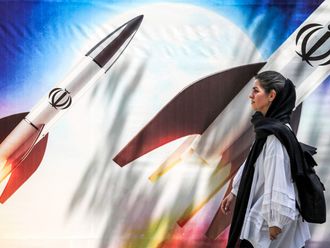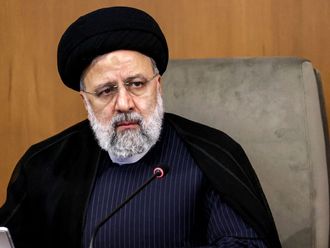BRUSSELS: Shutting the migrant smuggling route from Libya to Europe is “within our reach”, EU chief Donald Tusk said Thursday, arguing that doing so would be in both sides’ interest.
Flanked by Libya’s UN-backed leader Fayez al-Sarraj in Brussels, Tusk said he would propose extra “concrete and operational measures” to curb migrant flows when European Union leaders meet in Malta on Friday.
Tusk said the EU “proved” it could shut the eastern Mediterranean route with its deal last March with Turkey that has slashed the numbers of asylum seekers landing in Greece, previously the main entry point to Europe.
“Now it is time to close down the route from Libya to Italy,” Tusk told reporters, adding he discussed the issue on Wednesday with Italian Prime Minister Paolo Gentiloni.
“I can assure you it is within our reach,” the former Polish prime minister said. “What we need is the full determination to do that.”
He said the EU summit in Valletta, which he will co-host as European Council president, will discuss boosting cooperation with Libya.
“We have a shared interest and determination to reduce the number of irregular migrants risking their lives crossing the central Mediterranean,” he said.
“This is not sustainable ... as the smugglers let people drown and undermine the authority of the Libyan state for their own profit,” he added.
Though far fewer than the hundreds of thousands who had arrived in Greece before the deal with Turkey, a record 180,000 migrants landed in Italy last year while some 4,500 died on that central route.
Unlike the asylum seekers arriving in Greece from war-torn Syria and other conflict zones, most of those leaving Libya are sub-Saharan Africans deemed illegal economic migrants who face voluntary or involuntary expulsion.
The EU has begun training and equipping Libya’s coastguard to crack down on the smugglers and its leaders are expected Friday to examine a proposal to release new funds for the training programme as well as for UN agencies that can help the Libyans look after the migrants.
“We hope that EU mechanisms to help Libya will be more practical,” Sarraj said, adding the funds so far come to “very small amounts”.
Sarraj’s government is locked in a power struggle with a rival administration in eastern Libya as it seeks to end years of lawlessness following the 2011 overthrow of Muammar Gaddafi.










